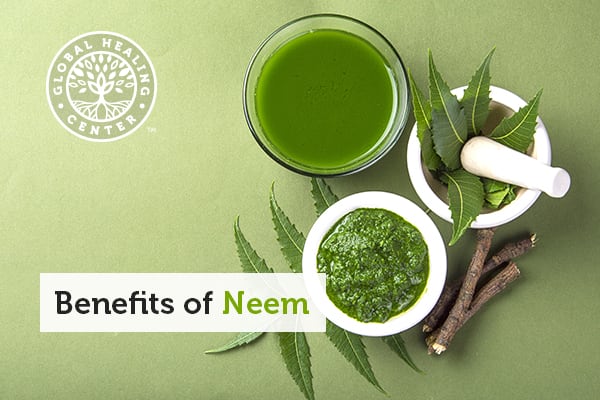Can you eat neem leaves? What are the health benefits?

The neem tree was (and is) the focal point for all the medical problems our ancestors had. Even today, doctors prescribe neem leaves or their extracts to alleviate digestive problems, treat liver disease and diabetes, and possibly reduce cancer risk (1).

Neem leaves are relatively common in drugs such as azadirachtin and nimbin. These molecules can give you dandruff-free hair, ageless skin, plaque-free teeth, and a non-ulcer stomach. Studies on the effects of neem against malaria and fever have received more attention.
Why Are Neem Leaves Therapeutic?
Various medical faculties around the world, including Ayurveda, Unani, Homeopathy and Modern Medicine, recognize the medicinal value of Neem. Its leaves, flowers, seeds, fruits, roots and bark have been used to treat inflammation, infection, fever, skin diseases and dental disease, and to reduce the risk of cancer (1), (2).

About 140 (or more) compounds were isolated from different parts of neem. The leaves contain Nimbin, Nimbanen, Vitamin C and several flavonoids. You can remove toxic intermediates and free radicals from your body (1).
Research also suggests that these agents help to reduce the inflammation in your body. They down regulate the genes that produce anti-inflammatory compounds and work well as anti-cancer drugs (1).
How Do Neem Leaves Benefit Your Health?
Neem leaves have anti-inflammatory, diabetic, antiulcer, malaria, antiseptic, antimicrobial, anti-oxidant and anti-cancer properties (2).

Neem leaves, because of their antioxidant activity, can help treat a variety of heart, skin and liver diseases. They work against pathogenic bacteria, fungi and viruses. The leaf extracts could also be a popular option in the treatment of diabetes.
1. Possess Antioxidant Effects

According to studies, the extracts of neem leaf, flower and bark have predominantly antioxidant properties. Polyphenols such as azadirachtin and nimbolide are responsible for this effect. They remove free radicals from your body and prevent them from harming vital tissues and organs (1).
Therefore, the use of neem leaves or their extracts may reduce the risk of atherosclerosis, cancer, diabetes, liver cirrhosis and other inflammatory diseases. Dried neem leaves have also been shown in animal experiments to enhance immunity (1).
2. May Help Manage Diabetes And Hypoglycemia

Several animal studies confirm the antidiabetic effect of neem leaves. In diabetics, it was found that 250 mg of Neemata extract per kg body weight lowered the glucose level (1).
The leaf chemicals suppress the activity of enzymes involved in glucose metabolism. They control the amount of glucose released into the bloodstream, thus preventing an increase in sugar content (3).
Some studies claim that these extracts could regenerate the insulin-producing cells in the pancreas. Neem leaves also lower cholesterol (triglyceride) and creatinine levels. In this way they can protect the heart, pancreas, liver and kidneys from inflammation caused by diabetes (4), (5).
3. May Heal Acne And Skin/Face Issues

Extracts of neem leaves are applied externally in boils and blisters in traditional medicine. They are often used in acne products. Together with neem, extracts of sacred basil, licorice and green tea were identified with the potential to inhibit acne-causing bacteria (Staphylococcus epidermis and Propionibacterium) (6).
Poultices and decoctions of neem leaves are used to treat septic sores, ringworm, eczema and burns and wounds infected with worms. Active neem compounds can treat various fungal and bacterial skin infections, including athlete’s foot and abscesses (7).
4. May Protect Your Liver

The bioactive components of neem, including azadirachtin, have potent liver protection properties (hepatoprotective). Animal subjects show a reduction in the levels of inflammatory liver enzymes when treated with these extracts (1).
Neem leaves may prevent changes in bilirubin and protein levels, which can cause liver damage. Therefore, you can use the extracts to treat liver lesions caused by drug overdoses, particularly those caused by an overdose of tuberculosis drugs and generic paracetamol derivatives (1), (8).
5. Have Anti-inflammatory Properties

Clinical trials demonstrate the anti-inflammatory effects of neem leaves at a dose of 200 mg / kg. Phytochemicals such as nimbidin suppress the functions of cells of the immune system (eg macrophages, neutrophils) in response to inflammation (1).
The leaves could reduce fever, pain and swelling (edema) in the study subjects. They prevent cell death in damaged tissues and induce cell death in cancer cells. Therefore, neem extracts have been used in the treatment of inflammatory diseases of the skin, heart, liver and kidneys (9).
What Are The Side Effects?

It is recommended not to have neem leaves or leaf extracts for a long time. Anecdotal evidence reports kidney failure in such people. The consumption of neem oil is also considered unsafe / toxic for adults and children (7).
However, several animal studies and clinical trials confirmed that neem is safe, although only at specific doses (1).
Therefore, it is better to ingest neem leaves or derivatives only under medical supervision.
If you are using neem on your skin / face, perform a patch test. Apply a small amount of the neem product to a skin patch on the forearm / leg. Wait 24 hours to check if a reaction / allergy develops. If you see redness, rashes, swelling or any discomfort, contact your doctor.

In addition, there is not enough information on the safety of neem products for children, pregnant and lactating women. In these cases, it is better to refrain from ingesting or using neem without medical consent.

Comments are closed.